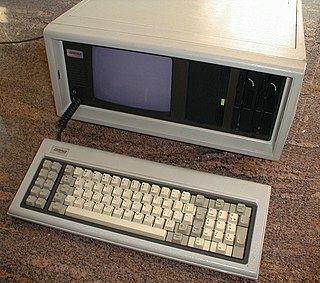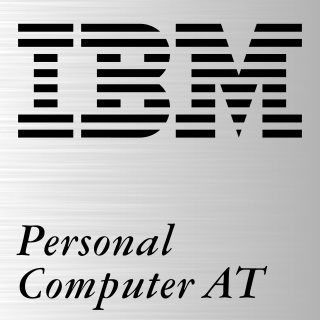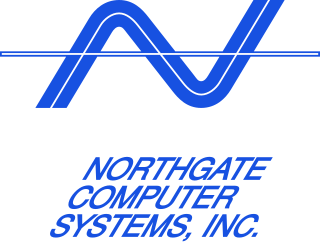Compaq Computer Corporation was an American information technology company founded in 1982 that developed, sold, and supported computers and related products and services. Compaq produced some of the first IBM PC compatible computers, being the second company after Columbia Data Products to legally reverse engineer the IBM Personal Computer. It rose to become the largest supplier of PC systems during the 1990s before being overtaken by HP in 2001. Struggling to keep up in the price wars against Dell, as well as with a risky acquisition of DEC, Compaq was acquired for US$25 billion by HP in 2002. The Compaq brand remained in use by HP for lower-end systems until 2013 when it was discontinued. The brand is licensed to third parties for use on electronics in Brazil and India.

IBM PC compatible computers are similar to the original IBM PC, XT, and AT that are able to use the same software and expansion cards. Such computers were referred to as PC clones, or IBM clones. The term "IBM PC compatible" is now a historical description only, since IBM no longer sells personal computers after it sold its personal computer division in 2005 to Chinese technology company Lenovo. The designation "PC", as used in much of personal computer history, has not meant "personal computer" generally, but rather an x86 computer capable of running the same software that a contemporary IBM PC could. The term was initially in contrast to the variety of home computer systems available in the early 1980s, such as the Apple II, TRS-80, and Commodore 64. Later, the term was primarily used in contrast to Apple's Macintosh computers.
Wintel is the partnership of Microsoft Windows and Intel producing personal computers using Intel x86-compatible processors running Microsoft Windows.

Michael Saul Dell is an American billionaire businessman and philanthropist. He is the founder, chairman, and CEO of Dell Technologies, one of the world's largest technology infrastructure companies. He is ranked the 20th richest person in the world by Bloomberg Billionaires Index, with a net worth of $60 billion as of February 2022.

A portable computer is a computer designed to be easily moved from one place to another and included a display and keyboard together, with a single plug, much like later desktop computers called all-in-ones (AIO), that integrate the system's internal components into the same case as the display. The first commercially sold portable was the 50-pound (23 kg) IBM 5100, introduced 1975. The next major portables were Osborne's 24-pound (11 kg) CP/M-based Osborne 1 (1981) and Compaq's 28-pound (13 kg), advertised as 100% IBM PC compatible Compaq Portable (1983). These "luggable" computers still required a continuous connection to an external power source; this limitation was later overcome by the laptop. Laptops were followed by lighter models, so that in the 2000s mobile devices and by 2007 smartphones made the term almost meaningless. The 2010s introduced wearable computers such as smartwatches.

The IBM Personal Computer/AT was released in 1984 as the fourth model in the IBM Personal Computer line, following the IBM PC/XT and its IBM Portable PC variant. It was designed around the Intel 80286 microprocessor.

Compaq's first computers' form factors were portable, also called "luggables", and then "lunchbox computers", and together constituted the Compaq Portable series. These computers measured approximately 16 inches (410 mm) deep, 8 inches (200 mm) tall, and approximately 20 inches (510 mm) wide. As the products evolved, laptops and notebooks were created offing a new level of portability that caused the market to explode.
The Advanced Computing Environment (ACE) was defined by an industry consortium in the early 1990s to be the next generation commodity computing platform, the successor to personal computers based on Intel's 32-bit instruction set architecture. The effort found little support in the market and dissolved due to infighting within the group and a lack of sales.

The Compaq Portable was an early portable computer which was one of the first IBM PC compatible systems. It was Compaq Computer Corporation's first product, to be followed by others in the Compaq Portable series and later Compaq Deskpro series. It was not simply an 8088-CPU computer that ran a Microsoft DOS as a PC "work-alike", but contained a reverse-engineered BIOS, and a version of MS-DOS that was so similar to IBM's PC DOS that it ran nearly all its application software. The computer was also an early variation on the idea of an "all-in-one".

PC Magazine is an American computer magazine published by Ziff Davis. A print edition was published from 1982 to January 2009. Publication of online editions started in late 1994 and have continued to the present day.

Joseph Rodney "Rod" Canion is an American computer scientist and businessman who co-founded Compaq Computer Corporation in 1982 and served as its first President and CEO.

Phoenix Technologies Ltd is an American company that designs, develops and supports core system software for personal computers and other computing devices. The company's products – commonly referred to as BIOS or firmware – support and enable the compatibility, connectivity, security and management of the various components and technologies used in such devices. Phoenix Technologies and IBM developed the El Torito standard.

Subnotebook was a marketing term for laptop computers that are smaller and lighter than a typical 'notebook' sized laptop.

Northgate Computer Systems, Inc., based in Eden Prairie, Minnesota, United States, was a mail-order personal computer company, founded in 1987 by Arthur "Art" Lazere.

Following the introduction of the IBM Personal Computer, or IBM PC, many other personal computer architectures became extinct within just a few years. It led to a wave of IBM PC compatible systems being released.

The Hewlett-Packard Company, commonly shortened to Hewlett-Packard or HP, was an American multinational information technology company headquartered in Palo Alto, California. HP developed and provided a wide variety of hardware components, as well as software and related services to consumers, small and medium-sized businesses (SMBs), and large enterprises, including customers in the government, health, and education sectors. The company was founded in a one-car garage in Palo Alto by Bill Hewlett and David Packard in 1939, and initially produced a line of electronic test and measurement equipment. The HP Garage at 367 Addison Avenue is now designated an official California Historical Landmark, and is marked with a plaque calling it the "Birthplace of 'Silicon Valley'".

Frederic Emery Davis, known as Fred Davis, is a veteran US technology writer and publisher who served as editor of A+'' magazine, MacUser, PC Magazine and PC Week; personal computer pioneer; technologist; and entrepreneur involved in the startups of Wired, CNET, Ask Jeeves, Lumeria, Jaduka, and Grabbit.
A legacy-free PC is a type of personal computer that lacks a floppy and/or optical disc drive, legacy ports, and an Industry Standard Architecture (ISA) bus. According to Microsoft, "The basic goal for these requirements is that the operating system, devices, and end users cannot detect the presence of the following: ISA slots or devices; legacy floppy disk controller (FDC); and PS/2, serial, parallel, and game ports." The legacy ports are usually replaced with Universal Serial Bus (USB) ports. A USB adapter may be used if an older device must be connected to a PC lacking these ports. According to the 2001 edition of Microsoft's PC System Design Guide, a legacy-free PC must be able to boot from a USB device.
Monorail Inc., later the Monorail Computer Corporation, was an American computer company founded in 1995 in Marietta, Georgia, by former Compaq executive Doug Johns. The company's Monorail PC, which was an all-in-one computer with a flat-panel LCD, prefigured Apple's similarly designed iMac G4 by over five years. According to Bloomberg Businessweek, the company "helped spawn a revolution in personal computers ... [selling] machines for as little as $999 in an effort to woo new price-sensitive users", to which larger manufacturers like Compaq and Packard Bell NEC followed suit. Monorail ceased operations in July 2005 After trying to rebrand as an e-solutions business in 2003










